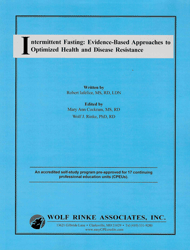|
Intermittent Fasting:
Evidence-Based Approaches to Optimized Health and Disease Resistance

| T357 |
17 CPEUs |
HARD COPY |
$162.95 |
|
| T357E |
17 CPEUs |
ELECTRONIC |
$152.95 |
|
|
A growing body of research supports the practice of intermittent fasting (IF) as an effective strategy to improve health, reduce the risk of many chronic diseases, and increase longevity. IF is associated with weight loss and reduced body fat, as well as improvements in many indicators of cardiometabolic health, including greater insulin sensitivity, lower heart rate and blood pressure, and reduced inflammation. IF enhances cognitive function and holds promise in the treatment and prevention of Alzheimer’s and Parkinson’s disease, and may be valuable in the prevention and treatment of cancer. Due to IF’s growing popularity, RDNs and NDTRs need to take a leading role in providing proper guidance and advice to clients who wish to try IF. This in-depth CPE activity, will enable you to:
- Formulate fasting schedules for clients to accommodate individual preferences and needs.
- Integrate fasting strategies into weight management and other diet plans for clients.
- Discuss the underlying mechanisms and rationale for the multiple health-enhancing and disease-preventing effects of IF.
- Discover how IF activates the major longevity pathways.
- Apprise patients/clients of the potential adverse effects of IF and how to avoid or minimize them, plus much, much more.
Share with a friend and Save! Click here for important information about
sharing.
To order an ADDITIONAL Reporting Form click below:
| T357F |
17 CPEUs |
REPORTING FORM |
$60.00 |

|
Intermittent Fasting:
Evidence-Based Approaches to Optimized Health and Disease Resistance
© 2024 Wolf Rinke Associates. All rights reserved for this self-directed accredited learning activity. Reproduction in whole or part without written permission, except for brief excerpts, is prohibited.
OBJECTIVES
Upon completion of this CPE activity you will be better able to:
- Compare and contrast all the distinct variations of intermittent fasting (IF).
- Assess which clients inquiring about IF may benefit from fasting and suggest a suitable IF version should they decide to proceed.
- Formulate fasting schedules for clients to accommodate individual preferences and needs.
- Integrate simple fasting strategies into weight management and other diet plans for your clients.
- Evaluate risk factors for potential contraindications of IF and recommend medical supervision when appropriate.
- Discuss the underlying mechanisms and rationale for the multiple health-enhancing and disease-preventive effects of IF, and why the simple practice of eating less often is an invaluable addition to lifestyle intervention strategies.
- Compare intermittent fasting with continuous calorie restriction with respect to metabolic improvements, weight loss, tolerability, and compliance.
- Discover the major longevity pathways and how IF activates them.
- Explain how, remarkably, IF is potentially beneficial as an adjunct therapy for cancer patients undergoing chemotherapy.
- Apprise patients/clients of the potential adverse effects of IF and how to avoid or minimize them.
ABOUT THE AUTHOR
Robert Iafelice, MS, RD, LDN is a freelance medical writer and member of the American Medical Writers Association. He has contributed several chapters to the 6th edition of Disease Prevention and Treatment, a medical reference book of evidence-based protocols to combat the diseases of aging.
Robert received a Bachelor of Arts degree in Chemistry from Miami University in Oxford, Ohio, and a Master of Science degree in Nutrition Science from Case Western Reserve University in Cleveland, Ohio. Most of his experience as a practicing registered dietitian was in the field of integrative/functional medicine with a focus on food allergy. Robert provided medical nutrition therapy at an integrative allergy-immunology clinic in Chicago, where he specialized in conducting double-blind, placebo-controlled food challenges – the gold standard for food allergy diagnosis.
Robert’s diverse background also includes extensive experience in fitness/wellness as a gym owner, university nutrition instructor, health educator in the nutraceuticals industry, and oncology. His favorite writing interests include intermittent fasting, nutritional ketosis, and high-intensity interval training.
Return to the top of page
If you prefer to order by phone, mail
or fax click below
or click here to contact us with
other questions.
For information about our other products and
services return to the sidebar at the top of the page.
|
|
|


